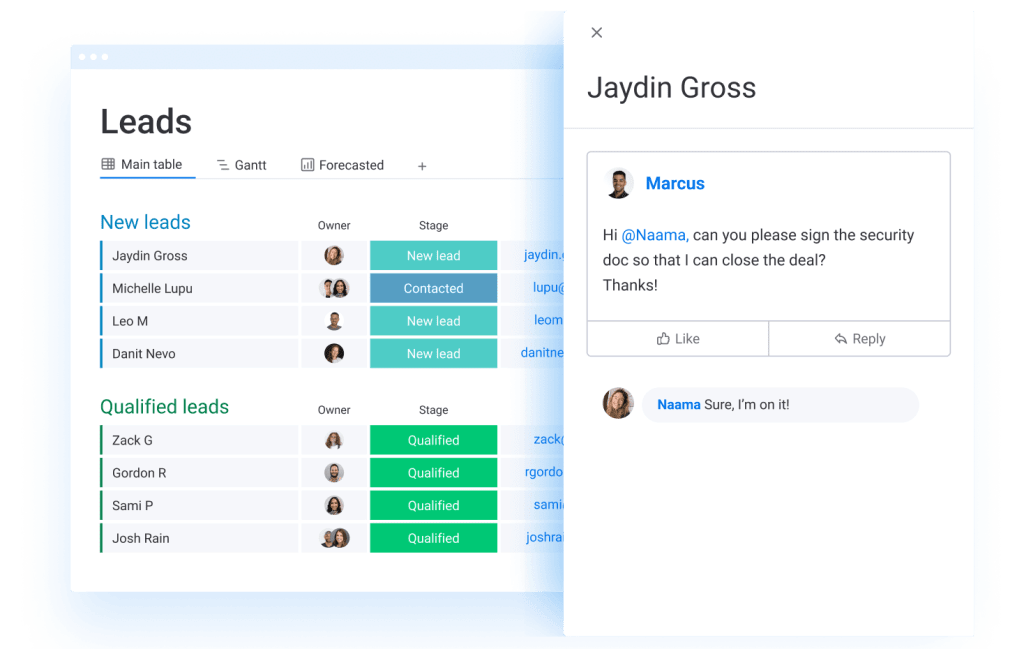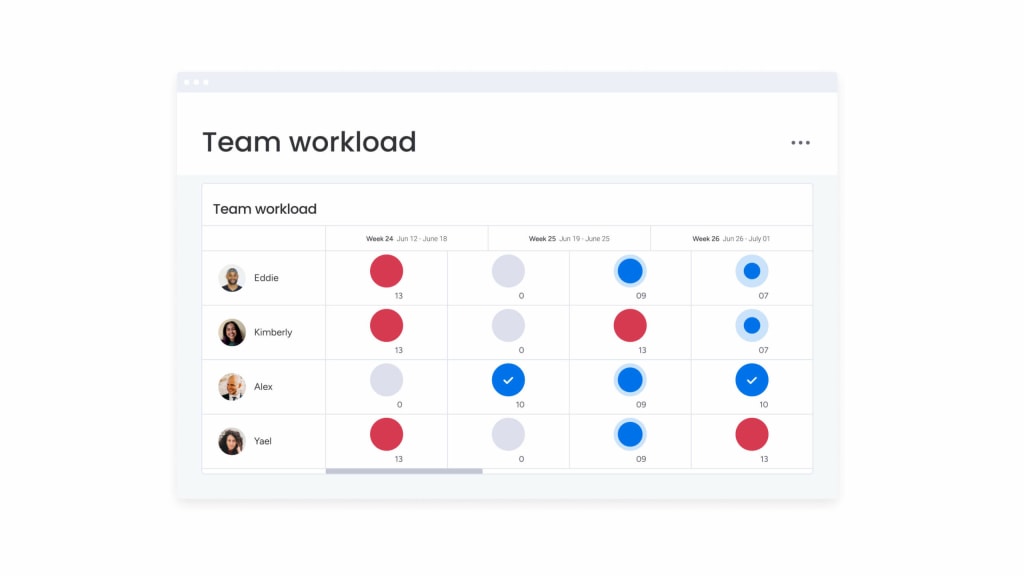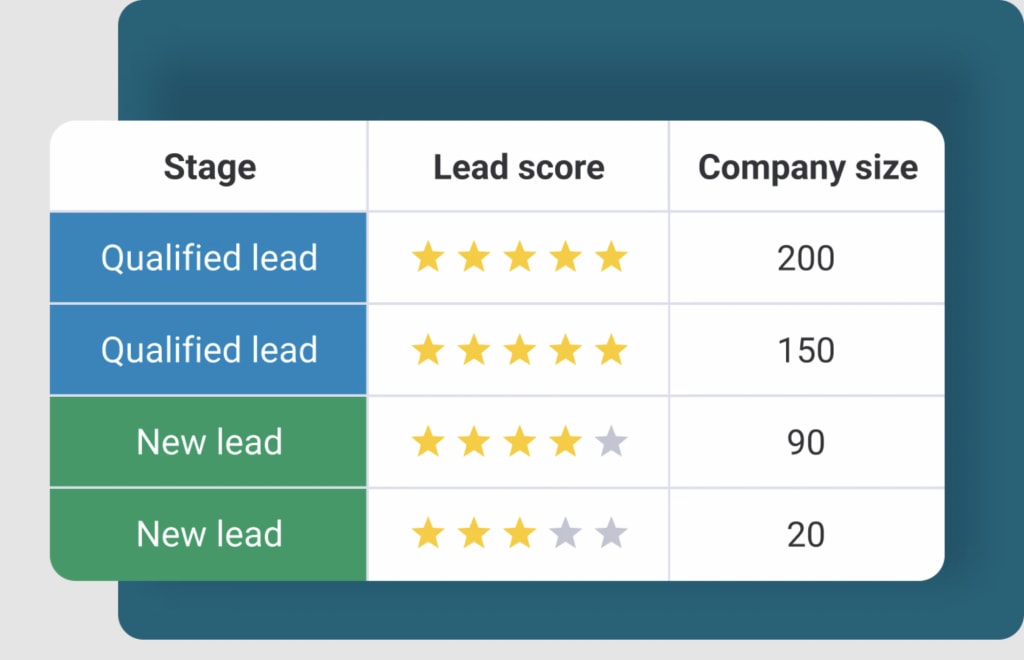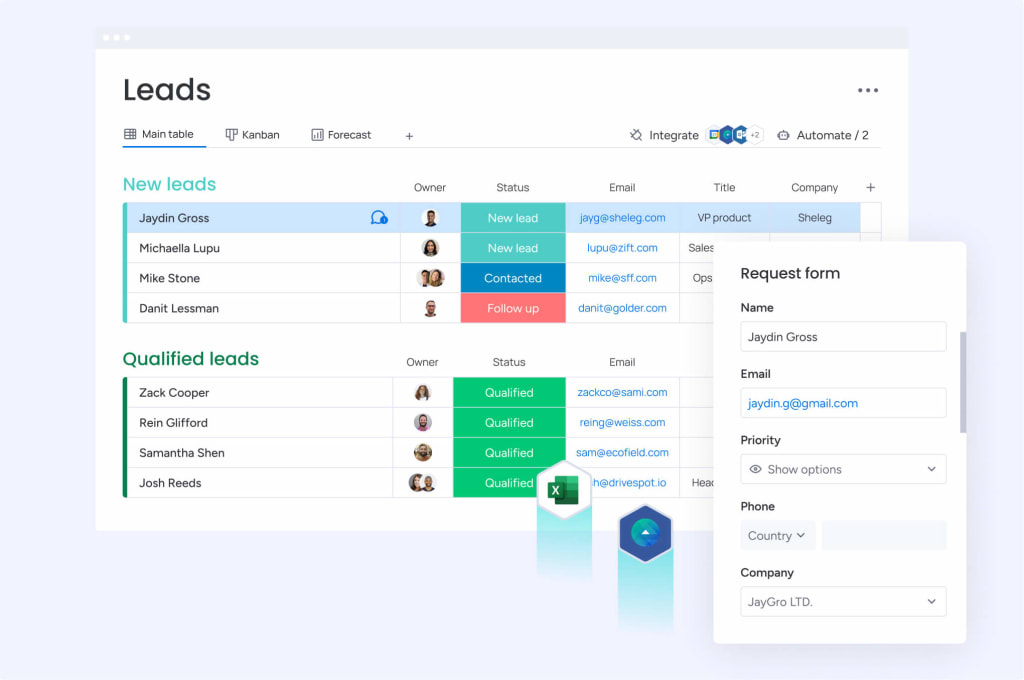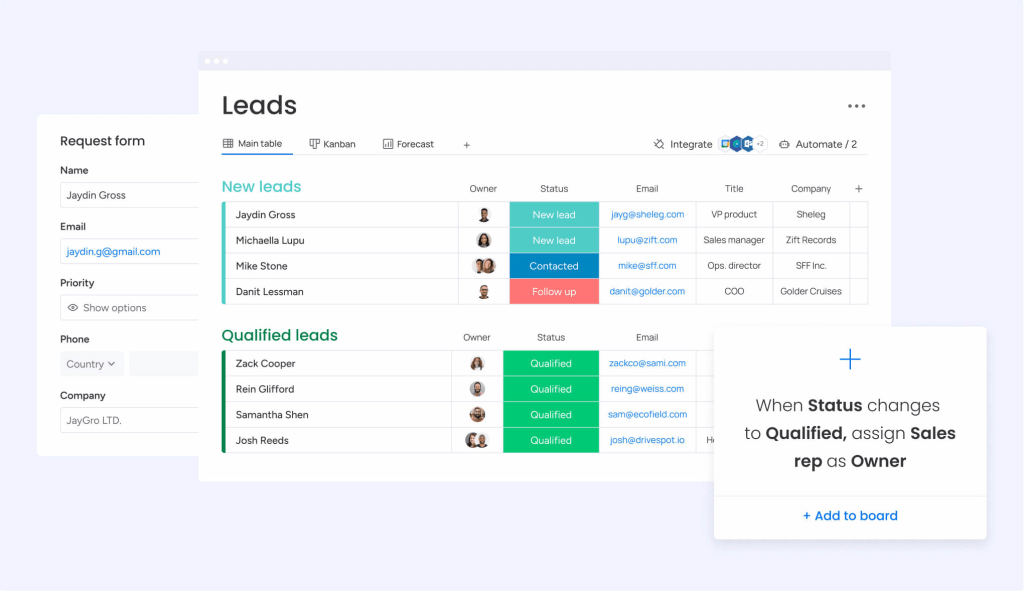Each lead is unique, just like each sales rep is unique. To maximize every opportunity with a potential customer, it’s important to pair them up with the best sales rep for the job.
This might mean distributing leads by geographical area or even assigning sales reps leads that match a specific profile that plays into the rep’s particular strength or experience. Regardless, lead distribution is crucial for nurturing each lead.
This blog post will look more closely at lead distribution, why exactly it’s important, and a few different lead distribution methods you can apply to your business.
Try monday sales CRMWhat is lead distribution?
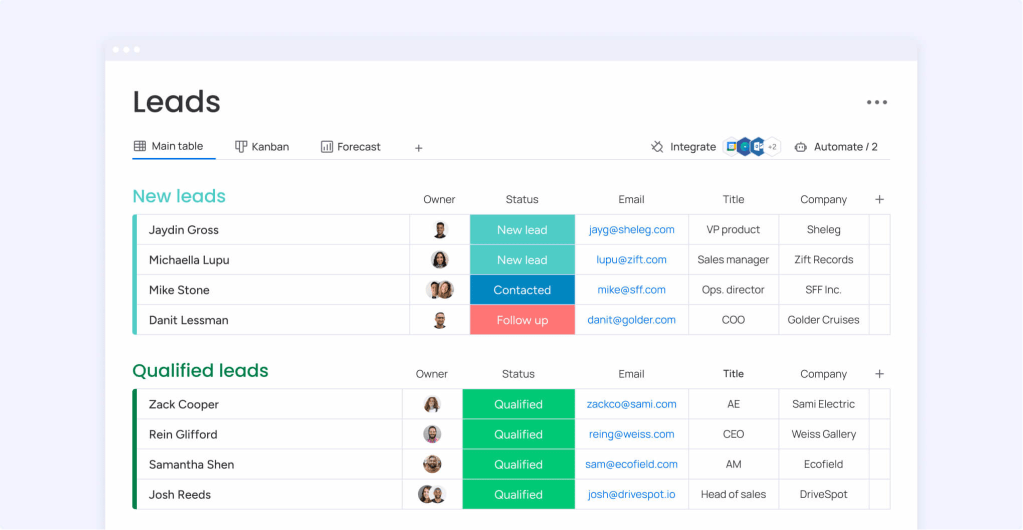
Lead distribution is the action of assigning each lead or group of leads to a sales rep to maximize success. Each sales rep might have their own set of skills or knowledge and likely have different levels of experience.
You wouldn’t want to put match a lead from a high-profile corporation with your newest sales rep since they’re likely not yet experienced enough to handle the lead correctly.This is why sales lead distribution is an important part of lead management. It allows organizations to filter and sort leads to direct them to the sales rep in the best position to capitalize on the opportunity.
What’s the difference between lead generation, lead capture, and lead distribution?
While the three terms might sound similar, they represent different parts of the lead-to-sale pipeline. A good understanding of each is helpful in learning how they all work together.
- Lead generation is the process of capturing and identifying potential customers through the use of different marketing tactics, such as asking for an email sign up in exchange for a discount code
- Once you’ve identified an audience in the lead generation process, lead capture is when you would actively gather information about those potential customers through mediums like forms or landing pages, for example, a contact capture form in order to download an eBook
- Lead distribution, as we saw earlier, is more about allocating those leads to the best sales reps to optimize the opportunity for each lead to turn into a conversion, such as using a CRM system to organize and allocate captured leads
Whatever stage your lead is in, it’s easier to organize them in a dedicated system, like a CRM, so that leads can be captured and distributed simply and efficiently.
Try monday sales CRMRead: The Lead Management Process: A Practical Guide
Why is lead distribution important?
The purpose of sales lead distribution isn’t only to get each lead into the most qualified hands, but it also has several other benefits that affect your business, your sales team, and even your clients.
1. Increases efficiency
Lead distribution makes the sales process more efficient by enabling different sales reps to pursue different leads. In the distribution process, leads are divided among reps so that sales teams can be as productive as possible. This way, you can also rest assured that each lead is getting equal attention.
2. Improved communication
Eliminate communication gaps between your sales reps and team members by assigning leads to each one so everyone knows exactly what they should be working on. When leads are distributed between reps, there’s more clarity around responsibilities, enabling reps to communicate on updates with their respective leads as well as the team’s end goals.
Try monday sales CRM3. Stronger customer service
With more time to focus on each lead, sales reps can work on establishing closer client relationships and provide each customer with better service, creating loyalty in the long term.
5 methods to use to distribute leads
How you go about distributing leads within your sales teams can be approached with different methods. These are some of the most common ones.
1. Round robin
The round robin method is simple and unbiased. Leads are distributed to each sales rep in a rotation. Essentially, incoming leads are assigned to a sales rep in a queue so that they’re spread out evenly. While this method is easy and fair, it doesn’t take into account each rep’s strengths, skills, experience, or availability, so it might not be right for every team.
2. Cherry picking
In this method, sales reps can choose their leads from the queue. In some workplaces, this can encourage healthy competition and allow reps to select leads they feel confident they can convert. But on the flip side, this can slow down response time and productivity if sales reps aren’t choosing enough leads to work on or leaving more challenging leads untouched.
3. Lead assignment rules
Either as a team or under the guidance of management, you can set specific rules for how leads are distributed. For example, if a lead comes in from a small business with less than 10 employees, you can hand it off to the newer sales reps to help them gain skills. Rules can also be set based on factors like territory, industry, or preferences. Lead distribution software or platforms like monday sales CRM can help you automate this process by creating rules for incoming leads so that they’re instantly assigned to the best sales rep.
4. Manual
Another option to distribute leads is to manually qualify and assign them one by one to the most fitting sales rep.
The upside to the manual method of lead distributions is that you can best match incoming leads with individual sales reps’ strengths.
However, it requires a lot of manual labor and a deep understanding of every one of your sales reps’ capabilities.
5. Region-specific
A common way of dividing leads is simply allocating them to reps responsible for a certain region, whether that’s a country, city, state, or other geographical area. This helps reps hone in on their geographical knowledge of an area, but some regions might be busier than others, leading to a potentially uneven distribution in the number of leads per rep.
Automate your lead distribution with monday sales CRM
Whichever method you opt for to qualify your leads, you’ll need a CRM system to keep everything in one place and keep track of the leads each rep is working on. monday sales CRM has many features that make it ideal for lead distribution. Let’s take a closer look at some of them.
Workload management
If you want to assign leads to your reps based on their current workload, you want to see exactly what’s on each team member’s plate at a glance. monday sales CRM allows you to see each sales rep’s current workload in a clear, visual display so that you can best choose who to send incoming leads.
Customizable boards and templates
Lead management templates make it quick and easy to get started with monday sales CRM, but the beauty of the platform lies in its customization. Add exactly the columns you need to track which rep is responsible for each lead, assign it a territory, a lead score, a deadline, and so much more.
Clear communication
Communication between sales reps, team members, and leads is streamlined all in one place. Integrate emails, internal messages, or other messaging systems to never miss an opportunity and constantly stay on the pulse of what’s happening in your team.
Automations
Automations in monday sales CRM can help you put the lead distribution process on auto-pilot. By setting rules based on each lead’s profile, they can be instantly assigned to the right sales person, eliminating the manual process of sorting and assigning each lead individually.
Aside from these features, you can find a lot more in monday sales CRM. With 70+ integrations and 200+ apps and tools for automation, lead scoring, lead capture, and email tracking, as well as iOS and Android apps to keep track of leads on the go, you can be sure your team is following up on leads no matter where they stand in the sales pipeline.
Try monday sales CRMFAQs
What should you consider when distributing leads?
When distributing leads to sales rep, consider factors such as a rep’s experience, strengths, workload, and knowledge, as well as the client’s region or preferences.
What is lead distribution in a CRM?
Lead distribution in a CRM is the process of assigning leads to the appropriate salesperson in your organization. With a CRM, this process is made a lot smoother and easier.
Who is a distribution manager?
The distribution manager may have other roles within the team, but ultimately they are the person responsible for delegating leads to specific sales reps.
Make lead distribution efficient with monday sales CRM
Lead distribution can be time-consuming if you’re doing it all manually, you have a big team with a lot of leads to sort through, or you don’t have a cohesive system to manage it all. By turning to a lead distribution platform like monday sales CRM, you can cut down on the time you spend distributing leads, allowing you and your team to focus more on converting those leads instead of organizing them.

